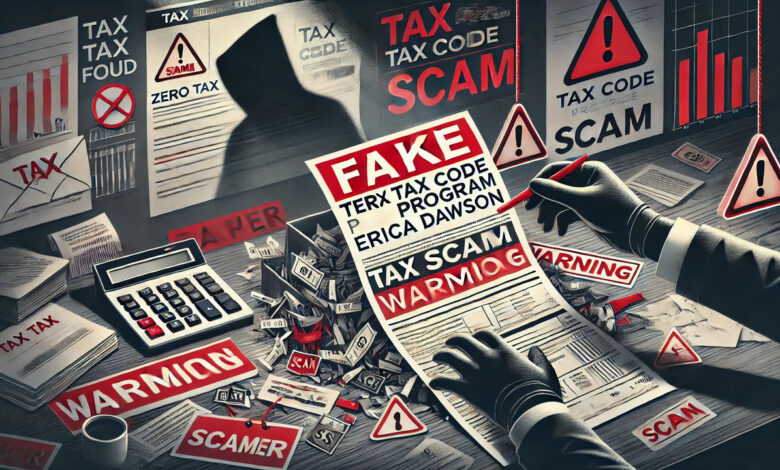Understanding the Zero Tax Code Program Erica Dawson: A Deceptive Tax Scheme

The “Zero Tax Code Program” associated with Erica Dawson has recently gained attention, but not for the right reasons. Marketed to eliminate tax burdens and provide financial relief, this program is a scam designed to exploit vulnerable individuals. This article will explore what the “Zero Tax Code Program Erica Dawson” really is, how it operates, and how to protect yourself from such fraudulent schemes.
What is the “Zero Tax Code Program Erica Dawson”?
The “Zero Tax Code Program” is a fraudulent scheme that allows taxpayers to reduce or eliminate their tax liabilities. The program is falsely attributed to Erica Dawson, a name likely chosen randomly or invented by the scammers to lend credibility to their claims. These scams typically involve unsolicited phone calls, emails, or robocalls where the scammer poses as a representative from a tax relief organization or a government entity, offering immediate tax forgiveness or relief.
How the Scam Operates
The operation of the ‘Zero Tax Code Program, Erica Dawson’ scam is straightforward and urgent. Victims are often contacted through robocalls or emails, where they are told they qualify for a special tax forgiveness program. The message usually includes a sense of urgency, urging the recipient to act quickly to take advantage of the offer. The scammers may impersonate IRS officials or claim to be from a non-existent government department, adding an air of legitimacy to their false claims.
Victims are often instructed to provide personal information, such as Social Security numbers, or to make an upfront payment to enroll in the program. Sometimes, they are asked to pay via unconventional methods like gift cards or wire transfers, making it difficult to trace the money once it has been sent. Once the scammers have obtained the victim’s information or money, they disappear, leaving them with unresolved tax issues and potential identity theft.
The Red Flags: Identifying the Scam
Several red flags can help you identify the “Zero Tax Code Program Erica Dawson” as a scam. First and foremost, legitimate tax relief programs do not contact taxpayers through unsolicited calls or emails. The IRS communicates with taxpayers via official mail and never demands immediate payment through non-traditional methods. If an offer sounds too good to be true, such as complete tax forgiveness without any formal application process, it is.
Another red flag is the use of high-pressure tactics. Scammers often create a sense of urgency, claiming that the offer is only available for a limited time or that failure to act immediately will result in severe consequences. This pressure is designed to prevent victims from taking the time to research the offer or consult with a trusted advisor.
The Impact of Falling for the Scam
Falling victim to the “Zero Tax Code Program Erica Dawson” scam can have severe financial and emotional consequences. Financially, victims may lose money paid to the scammers and still be liable for their original tax debts. Additionally, providing personal information to these criminals can lead to identity theft, further compounding the victim’s financial woes.
Emotionally, dealing with unresolved tax issues and the realization of being scammed can take a significant toll. Victims may feel embarrassed or ashamed, which can deter them from seeking help. It’s important to remember that scams are designed to deceive, and falling for one does not reflect your intelligence or diligence. It’s okay to feel these emotions, and seeking support and guidance to overcome them is important.
Legitimate Tax Relief Options
While the “Zero Tax Code Program Erica Dawson” is a scam, there are legitimate ways to address tax issues. The IRS offers several programs to help taxpayers manage their tax debts. One such program is the Offer in Compromise (OIC), which allows eligible taxpayers to settle their tax debt for less than the full amount owed. Another option is to set up an installment agreement, which enables taxpayers to pay their tax debt over time in smaller, more manageable payments. These are examples of legitimate tax relief programs backed by the IRS and can provide real financial relief.
If you are facing tax problems, seeking help from a qualified tax professional is crucial. A licensed tax advisor can guide you through the process and ensure you take advantage of legitimate programs. They can also help you avoid falling prey to scams like the “Zero Tax Code Program Erica Dawson.”
How to Protect Yourself from Tax Scams
Protecting yourself from scams like the “Zero Tax Code Program Erica Dawson” requires vigilance and knowledge. Always verify the legitimacy of any tax-related offer with the IRS or a trusted tax professional. Be cautious about sharing personal or financial information over the phone or online, especially if you did not initiate the contact. If you receive a suspicious call or email, do not engage with the sender; immediately report it to the IRS or the appropriate authorities. By reporting these scams, you can help prevent others from falling victim to them.
Education is your best defense against scams. The IRS regularly updates its website with information on common tax scams and tips for protection. Staying informed about the latest scams and understanding how they operate can help you recognize and avoid them. By staying informed, you can take control of your financial security and protect yourself from potential harm.
Conclusion: Stay Vigilant, Stay Informed
The “Zero Tax Code Program Erica Dawson” is just one of many scams designed to exploit taxpayers. By recognizing the signs of a scam, understanding legitimate tax relief options, and staying vigilant, you can protect yourself from financial harm. Always consult a trusted tax professional or the IRS to verify any tax-related information, and remember: if an offer sounds too good to be true, it probably is.




